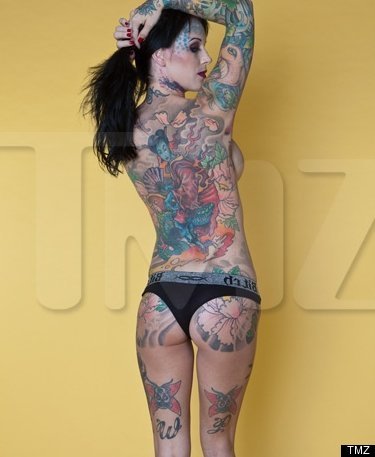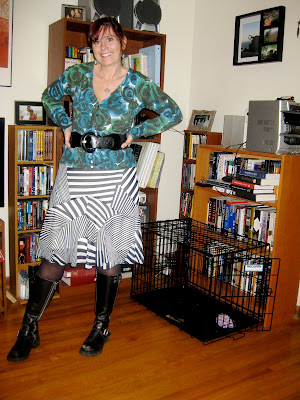Basse Mode has recently asked for submissions on the meaning of fashion. Here is my take.
I have already said that I do not consider myself a fashionista. What draws me to fashion, to clothing is not the sense of the word as a noun, which for me implies some sort of hegemonic power that controls the whims and desires of women, but fashion's powerful sense as a verb. Fashioning means making; it means creating. By wearing one thing I can help to create and present a certain self, a certain identity; by wearing something else I fashion myself in another way. Clothing can be a powerful tool for making assertions about political views, feminist views, religious beliefs, and so forth. I'm a pierced, tattooed academic who likes to wear dresses and blazers. I shop at thrift stores as much as possible. I like to buy and wear Fluevogs because they are funky and because I approve of Fluevog's labor policy. I wear nerdy glasses most of the time when I teach because nothing says scholarly authority like a pair of glasses. I'm a feminist, female academic who likes to mix metaphors as much as I like to mix patterns.
In the sixteenth and seventeenth century (the period that I study) men and women in Europe and its colonies dressed according to their social station, race, and sex, and sumptuary laws issued by both civil and church authorities attempted to make sure that people did not commit sins of luxury or subvert the social order by dressing above their rank. The fact that in many places these laws had to be issued with significant frequency suggests that people violated these laws. There is evidence that lower class women donned pearls, and precious stones, and lace in the face of prohibitions, that people luxuriated in dress, that female actresses dared to wear pants without a skirt over them on the stage, that some women cross-dressed to escape the proscribed roles of women or to illicitly meet with lovers. This all indicates that people saw dress as a powerful tool for defining who they were and who they no longer wanted to be. Clothes were important and often treasured possessions.
Today in the United States we don't have sumptuary laws to violate and rebel against, but that doesn't mean there aren't constant social pressures to look a certain way, to wear the next trendy thing, to be careful about wearing skinny jeans if your legs aren't a mile long and the width of a pencil. There is tremendous pressure on women to be thin, just as at the same time many people refuse to acknowledge that a woman who is naturally thin can be a "real woman." There is the idea that women should be slaves to dieting in order to have a body mandated by an industry standard and that they are slaves to fashion, to consumerism, to buying the next best thing because the cut and style of the thing that was so hot three months ago is now dated, frumpy, and wearing it would get you on the fashion taboos page.
I am no slave to fashion. I am no fashionista. Some people may disagree with my take and with my sense of style. That's okay. It's about choice. As I said, my view of fashion is about verbs not nouns. It is much more about agency, about choosing what I want to wear based on context, confidence, adventure, feminism, asserting or subverting authority, and a sense of humor. I self-fashion. I construct my identities and I do it with the help of what's in my wardrobe.
If you haven't yet checked out the Basse Mode project, you should!
Are you a self-fashioner?
|
|
|---|
Subscribe to:
Post Comments (Atom)

















No comments:
Post a Comment